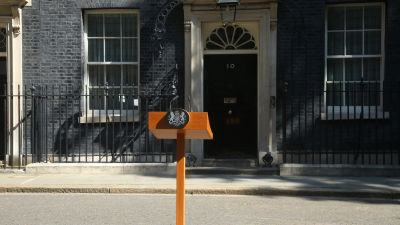Explainer
Why the British public is not choosing the next prime minister

Britain will soon have its fourth prime minister in three years, following the resignation of Liz Truss.
Observers of Britain’s governing structure can be forgiven for scratching their heads in recent weeks as they watch the country reel through a succession of prime ministers without holding an election.
While Labour is demanding an election, the Conservatives are pushing on with choosing another prime minister from within their own ranks.
So, how exactly is a new prime minister elected and why does the public not have a say in who fills that position?
How is a prime minister elected?
Britain is divided into 650 local constituencies, and during an election people tick a box for the representative they want to become their local MP.
The party that wins the majority of seats gets to form a government, and that party's leader automatically becomes prime minister.
While coalitions are possible, Britain's voting system favors the two largest parties and in most cases a single party will take an absolute majority of seats, as is the case for the Conservatives in the current Parliament.
Want a quick and expert briefing on the biggest news stories? Listen to our latest podcasts to find out What You Need To Know...
How does the Conservative Party choose their leaders?
Since 1922, all of Britain’s 20 prime ministers have come from either the Labour Party or the Conservative Party.
In effect, this means the members of these parties have an outsized influence on who will be the country’s prime minister.
For the Conservative Party, their lawmakers must first signal their support for a potential leader.
If there is enough support, this person will become an official candidate. All Conservative MPs then cast a series of votes, gradually whittling down the number of candidates to two.
Finally, the party membership - around 180,000 people - vote between these two candidates. During the previous leadership race this summer they chose Ms Truss over Rishi Sunak.
If the MPs are able to unite behind a single candidate then there is no need for the wider party members to have a vote.
Previously, this happened in 2016 when the lawmakers backed Theresa May, following the resignation of David Cameron.
Elsewhere, the Labour Party has its own process of determining a new leader.
Did the public have a say in appointing Boris Johnson?
Mr Johnson was selected by his party to become the next Tory leader in 2019, following the resignation of Ms May.
He had already been prime minister for five months when electors ticked their ballot cards in December 2019.
However, voters' support for the Conservative Party did cement his position as prime minister.
Even in that election, though, it was only actually around 70,000 people who got the chance to vote directly for or against Mr Johnson - those who happened to live in his Parliamentary constituency of South Ruislip and Uxbridge, in west London.
Will there be a general election soon?
At present, it seems unlikely that a general election will take place in the near future.
The previous vote saw the Tories claim a staggering victory less than three years ago, and under the Fixed-term Parliaments Act 2011 there can be a period of five years before the next general election must take place.
And with the current polls indicating significant public favour in support of Labour, the likelihood of an early election appears low.
However, some Conservative MPs - including former culture secretary Nadine Dorries - have called for a general election in the wake of Mr Johnson withdrawing from the race to become to the next PM.
Tory MP Christopher Chope told BBC Radio 4′s Today programme that a "general election is the only answer" to find a leader who "commands the respect of the party and the country".
When is the next general election?
No date has officially been announced for the next UK general election, but before her resignation Ms Truss had signalled that she intends to call one in two years' time.
She pledged to Tory members that she would deliver "a great victory for the Conservative Party in 2024" following her victory in the Tory leadership contest.